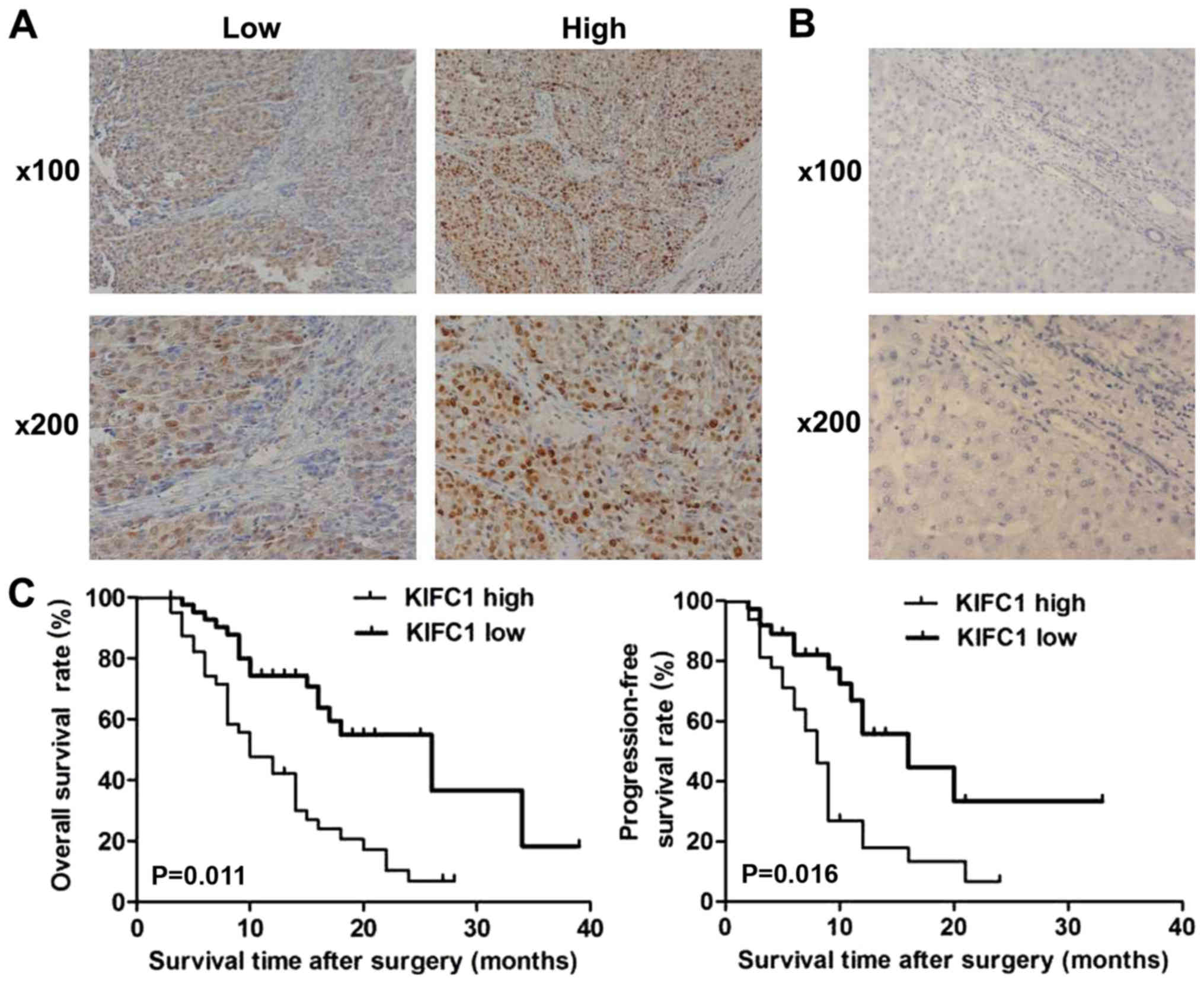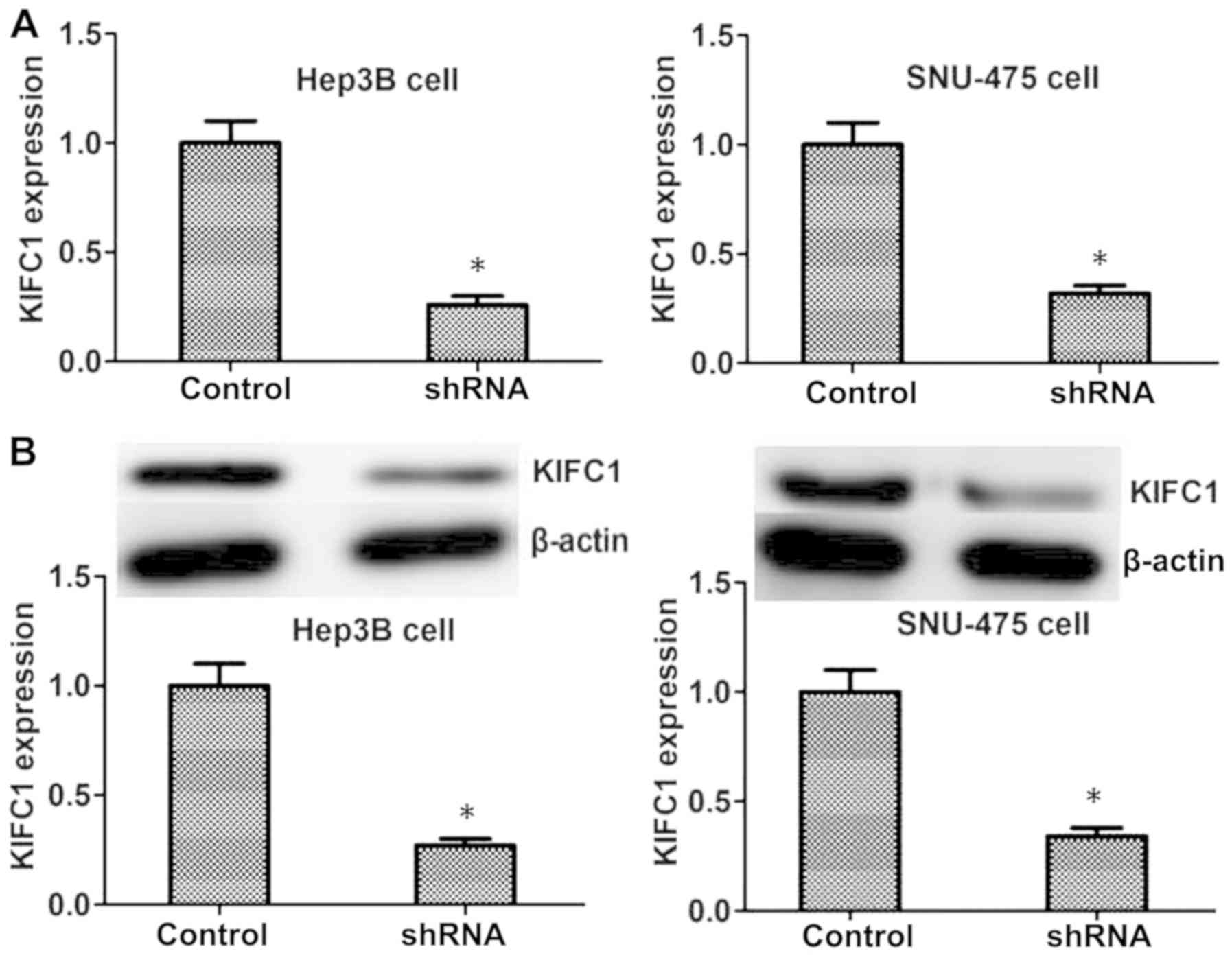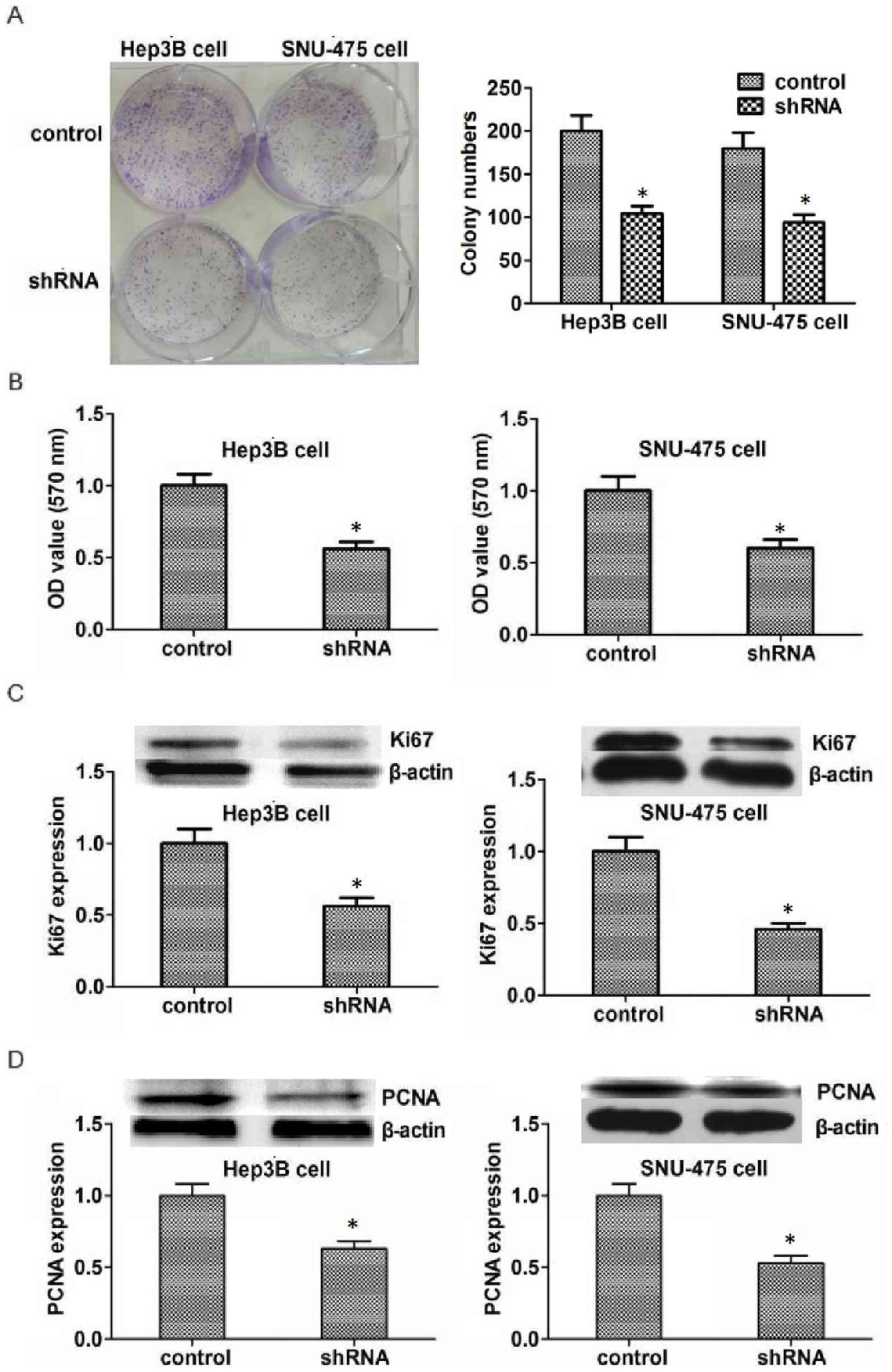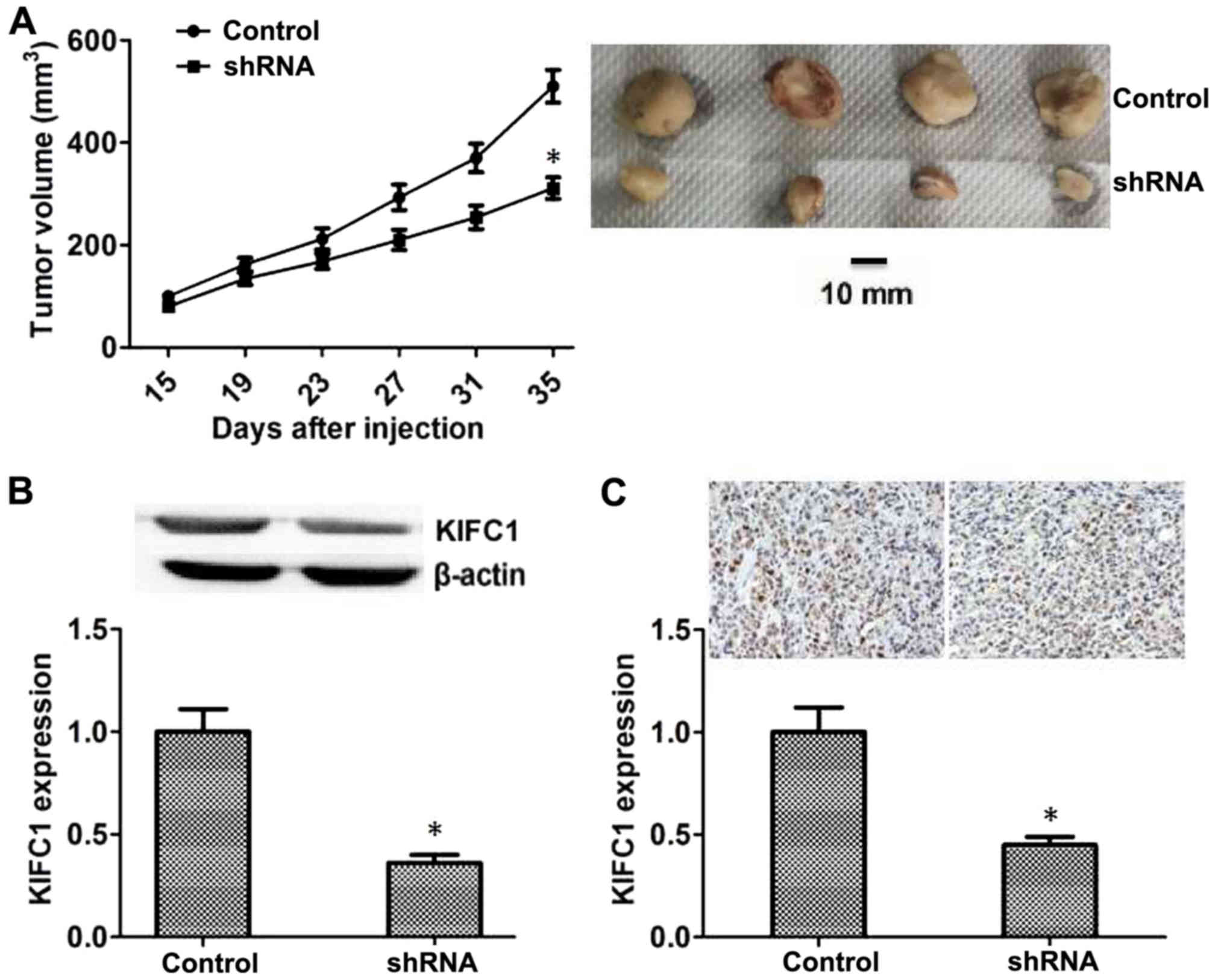|
1
|
Dhanasekaran R and Talwalkar JA: Quality
of cancer care in patients with cirrhosis and hepatocellular
carcinoma. Curr Gastroenterol Rep. 17:342015. View Article : Google Scholar : PubMed/NCBI
|
|
2
|
Lertpipopmetha K and Auewarakul CU: High
incidence of hepatitis B infection-associated cirrhosis and
hepatocellular carcinoma in the Southeast Asian patients with
portal vein thrombosis. BMC Gastroenterol. 11:662011. View Article : Google Scholar : PubMed/NCBI
|
|
3
|
Ziogas IA and Tsoulfas G: Advances and
challenges in laparoscopic surgery in the management of
hepatocellular carcinoma. World J Gastrointest Surg. 9:233–245.
2017. View Article : Google Scholar : PubMed/NCBI
|
|
4
|
Schietroma I, Scheri GC, Pinacchio C,
Statzu M, Petruzziello A and Vullo V: Hepatitis C virus and
hepatocellular carcinoma: Pathogenetic mechanisms and impact of
direct-acting antivirals. Open Virol J. 12:16–25. 2018. View Article : Google Scholar : PubMed/NCBI
|
|
5
|
Kim D, Li AA, Perumpail BJ, Gadiparthi C,
Kim W, Cholankeril G, Glenn JS, Harrison SA, Younossi ZM and Ahmed
A: Changing trends in etiology-based and ethnicity-based annual
mortality rates of cirrhosis and hepatocellular carcinoma in the
United States. Hepatology. 69:1064–1074. 2019. View Article : Google Scholar : PubMed/NCBI
|
|
6
|
Lee HY, Jung JH, Kang YS, Kim YS, Moon HS,
Park KO, Lee YS, Kim SM, Seo SW, Lee SW, et al: Clinical
significance of transiently elevated serum AFP level in developing
hepatocellular carcinoma in HBsAg positive-liver cirrhosis. Korean
J Gastroenterol. 43:252–259. 2004.(In Korean). PubMed/NCBI
|
|
7
|
Rasool M, Rashid S, Arooj M, Ansari SA,
Khan KM, Malik A, Naseer MI, Zahid S, Manan A, Asif M, et al: New
possibilities in hepatocellular carcinoma treatment. Anticancer
Res. 34:1563–1571. 2014.PubMed/NCBI
|
|
8
|
Ando E, Tanaka M, Yamashita F, Kuromatsu
R, Takada A, Fukumori K, Yano Y, Sumie S, Okuda K, Kumashiro R and
Sata M: Diagnostic clues for recurrent hepatocellular carcinoma:
Comparison of tumour markers and imaging studies. Eur J
Gastroenterol Hepatol. 15:641–648. 2003. View Article : Google Scholar : PubMed/NCBI
|
|
9
|
Aggarwal M, Arain A and Jin Z: Systemic
treatment for hepatocellular carcinoma. Chronic Dis Transl Med.
4:148–155. 2018. View Article : Google Scholar : PubMed/NCBI
|
|
10
|
Huang A, Zhao X, Yang XR, Li FQ, Zhou XL,
Wu K, Zhang X, Sun QM, Cao Y, Zhu HM, et al: Circumventing
intratumoral heterogeneity to identify potential therapeutic
targets in hepatocellular carcinoma. J Hepatol. 67:293–301. 2017.
View Article : Google Scholar : PubMed/NCBI
|
|
11
|
Ma DD, Pan MY, Hou CC, Tan FQ and Yang WX:
KIFC1 and myosin Va: Two motors for acrosomal biogenesis and
nuclear shaping during spermiogenesis of Portunus trituberculatus.
Cell Tissue Res. 369:625–640. 2017. View Article : Google Scholar : PubMed/NCBI
|
|
12
|
She ZY, Pan MY, Tan FQ and Yang WX: Minus
end-directed kinesin-14 KIFC1 regulates the positioning and
architecture of the Golgi apparatus. Oncotarget. 8:36469–36483.
2017. View Article : Google Scholar : PubMed/NCBI
|
|
13
|
Kim N and Song K: KIFC1 is essential for
bipolar spindle formation and genomic stability in the primary
human fibroblast IMR-90 cell. Cell Struct Funct. 38:21–30. 2013.
View Article : Google Scholar : PubMed/NCBI
|
|
14
|
Lee SH, Joo K, Jung EJ, Hong H, Seo J and
Kim J: Export of membrane proteins from the Golgi complex to the
primary cilium requires the kinesin motor, KIFC1. FASEB J.
32:957–968. 2018. View Article : Google Scholar : PubMed/NCBI
|
|
15
|
Yang WX and Sperry AO: C-terminal kinesin
motor KIFC1 participates in acrosome biogenesis and vesicle
transport. Biol Reprod. 69:1719–1729. 2003. View Article : Google Scholar : PubMed/NCBI
|
|
16
|
Hou CC and Yang WX:
Acroframosome-dependent KIFC1 facilitates acrosome formation during
spermatogenesis in the caridean shrimp Exopalaemon modestus. PLoS
One. 8:e760652013. View Article : Google Scholar : PubMed/NCBI
|
|
17
|
Liu Y, Zhan P, Zhou Z, Xing Z, Zhu S, Ma
C, Li Q, Zhu Q, Miao Y, Zhang J, et al: The overexpression of KIFC1
was associated with the proliferation and prognosis of non-small
cell lung cancer. J Thorac Dis. 8:2911–2923. 2016. View Article : Google Scholar : PubMed/NCBI
|
|
18
|
Li G, Chong T, Yang J, Li H and Chen H:
Kinesin motor protein KIFC1 is a target protein of miR-338-3p and
associated with poor prognosis and progression of renal cell
carcinoma. Oncol Res. 27:125–137. 2018. View Article : Google Scholar : PubMed/NCBI
|
|
19
|
Li Y, Lu W, Chen D, Boohaker RJ, Zhai L,
Padmalayam I, Wennerberg K, Xu B and Zhang W: KIFC1 is a novel
potential therapeutic target for breast cancer. Cancer Biol Ther.
16:1316–1322. 2015. View Article : Google Scholar : PubMed/NCBI
|
|
20
|
Sekino Y, Oue N, Shigematsu Y, Ishikawa A,
Sakamoto N, Sentani K, Teishima J, Matsubara A and Yasui W: KIFC1
induces resistance to docetaxel and is associated with survival of
patients with prostate cancer. Urol Oncol. 35:31.e13–31.e20. 2017.
View Article : Google Scholar
|
|
21
|
Xiao YX and Yang WX: KIFC1: A promising
chemotherapy target for cancer treatment? Oncotarget.
7:48656–48670. 2016. View Article : Google Scholar : PubMed/NCBI
|
|
22
|
Han J, Wang F, Lan Y, Wang J, Nie C, Liang
Y, Song R, Zheng T, Pan S, Pei T, et al: KIFC1 regulated by
miR-532-3p promotes epithelial-to-mesenchymal transition and
metastasis of hepatocellular carcinoma via gankyrin/AKT signaling.
Oncogene. 38:406–420. 2019. View Article : Google Scholar : PubMed/NCBI
|
|
23
|
Seino S, Tsuchiya A, Watanabe Y, Kawata Y,
Kojima Y, Ikarashi S, Yanai H, Nakamura K, Kumaki D, Hirano M, et
al: Clinical outcome of hepatocellular carcinoma can be predicted
by the expression of hepatic progenitor cell markers and serum
tumour markers. Oncotarget. 9:21844–21860. 2018. View Article : Google Scholar : PubMed/NCBI
|
|
24
|
Hiraoka A, Michitaka K, Kumada T and Kudo
M: ALBI score as a novel tool in staging and treatment planning for
hepatocellular carcinoma: Advantage of ALBI grade for universal
assessment of hepatic function. Liver Cancer. 6:377–379. 2017.
View Article : Google Scholar : PubMed/NCBI
|
|
25
|
DeLeon TT, Ahn DH, Bogenberger JM,
Anastasiadis PZ, Arora M, Ramanathan RK, Aqel BA, Vasmatzis G,
Truty MJ, Oklu R, et al: Novel targeted therapy strategies for
biliary tract cancers and hepatocellular carcinoma. Future Oncol.
14:553–566. 2018. View Article : Google Scholar : PubMed/NCBI
|
|
26
|
Cancer Genome Atlas Research Network.
Electronic address: wheeler@bcm.edu, . Cancer Genome Atlas Research
Network: Comprehensive and integrative genomic characterization of
hepatocellular carcinoma. Cell. 169:1327–1341.e23. 2017. View Article : Google Scholar : PubMed/NCBI
|
|
27
|
Gao HJ, Zhao MC, Zhang YJ, Zhou DS, Xu L,
Li GB, Chen MS and Liu J: Monocarboxylate transporter 4 predicts
poor prognosis in hepatocellular carcinoma and is associated with
cell proliferation and migration. J Cancer Res Clin Oncol.
141:1151–1162. 2015. View Article : Google Scholar : PubMed/NCBI
|
|
28
|
Xiao YX, Shen HQ, She ZY, Sheng L, Chen
QQ, Chu YL, Tan FQ and Yang WX: C-terminal kinesin motor KIFC1
participates in facilitating proper cell division of human
seminoma. Oncotarget. 8:61373–61384. 2017. View Article : Google Scholar : PubMed/NCBI
|
|
29
|
Mittal K, Choi DH, Klimov S, Pawar S, Kaur
R, Mitra AK, Gupta MV, Sams R, Cantuaria G, Rida PCG and Aneja R: A
centrosome clustering protein, KIFC1, predicts aggressive disease
course in serous ovarian adenocarcinomas. J Ovarian Res. 9:172016.
View Article : Google Scholar : PubMed/NCBI
|
|
30
|
Marsman M, Jordens I, Kuijl C, Janssen L
and Neefjes J: Dynein-mediated vesicle transport controls
intracellular Salmonella replication. Mol Biol Cell. 15:2954–2964.
2004. View Article : Google Scholar : PubMed/NCBI
|
|
31
|
Huang X, Liu F, Zhu C, Cai J, Wang H, Wang
X, He S, Liu C, Yao L, Ding Z, et al: Suppression of KIF3B
expression inhibits human hepatocellular carcinoma proliferation.
Dig Dis Sci. 59:795–806. 2014. View Article : Google Scholar : PubMed/NCBI
|
|
32
|
Yang T, Zhang XB and Zheng ZM: Suppression
of KIF14 expression inhibits hepatocellular carcinoma progression
and predicts favorable outcome. Cancer Sci. 104:552–557. 2013.
View Article : Google Scholar : PubMed/NCBI
|
|
33
|
Wang J, Ma S, Ma R, Qu X, Liu W, Lv C,
Zhao S and Gong Y: KIF2A silencing inhibits the proliferation and
migration of breast cancer cells and correlates with unfavorable
prognosis in breast cancer. BMC Cancer. 14:4612014. View Article : Google Scholar : PubMed/NCBI
|


















